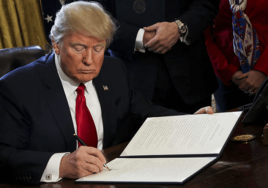Turkey Is Angry: Trump Recognized Genocide and Artsakh
Thursday, April 25, 2019
The Turkish foreign ministry, the Turkish ambassador in Washington have criticized the U.S. President Donald Trump’s annual message on the Armenian genocide on April 24.
In his message the U.S. President again avoided the word genocide but the problem is not the mechanical expectation or perception of this word. In the 2019 address the American president used some hints which send interesting signals between the lines.
In particular, the message refers to the human rights activist and lawyer Raphael Lemkin who is the author of the term “genocide” and has had a huge contribution to the development and adoption of the international convention on the prevention and punishment of the crime of genocide. A clear reference to Lemkin is but a clear hint at the recognition and legal power of the fact of the genocide.
At the same time, the message of the U.S. president states that they “pledge to learn from past tragedies so as to not to repeat them”. Learning about what does the U.S. President mean and whom does he pledge? Definitely not Turkey because Turkey has benefited from these mistakes of the past. And not only Turkey but also other countries, such as Russia as it was in Russia’s interests to neutralize the Treaty of Sevres signed five years after the genocide, which was done jointly by Russia and Turkey by signing a year later the Treaty of Moscow and thereby agreeing to crush the possibility of an influential Armenian state. By the way, Turkey and Russia have been loyal to this treaty to date.
Is the U.S. President talking about learning a lesson from this mistake that the United States made when it allowed the neutralization of the Treaty of Sevres, the result of its effort? Does the U.S. President pledge to prevent such mistakes as a Russian-Turkish regional alliance which is safeguarded at a political level of a treaty but has been de facto dissolved by the movement of Artsakh and the Armenian military victory?
In this case, Trump’s Israeli-Near Eastern policy of recognizing the realities may be applicable in the Caucasus because a primary option of drawing conclusions from the past and preventing tragedies could be the recognition of the reality in the Artsakh area. Because, as the April war demonstrated, the opposite – questioning realities on one side – leads to tragedies.
By the way, in this sense it is highly symbolic that on April 24 another American state recognized the independence of Artsakh. Colorado is the ninth state that recognized Artsakh.
Turkey’s response to Trump’s message is clear. The U.S. President actually recognized both the genocide and Artsakh. It is another issue whether the recognition of the message of the U.S. President expresses strategic approaches and is a serious proposal of a dialogue to Armenia in terms of formalization of recognition with a prospect for further clarification and to what extent it is determined by the current tension in the American-Turkish relations and Trump’s national interests.
On the other hand, Yerevan must consider this message in the context of its interests and take from it what it needs because most probably the basis of motivation of the message is subject to transformation depending on how practical Yerevan’s response, even if between the lines, will be to signals in the message.
https://www.lragir.am/en/2019/04/25/71749





